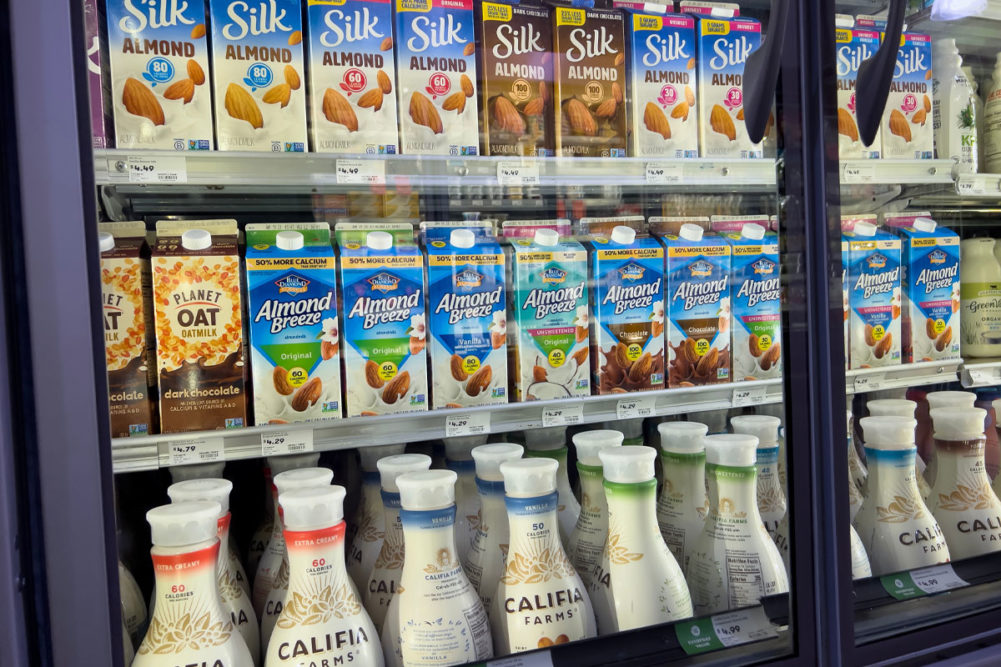WASHINGTON — The US Food and Drug Administration recommended voluntary nutrient statements for plant-based milk alternatives in draft guidance issued Feb. 22. The statement should convey how the alternative compares to milk based on fluid milk substitutes nutrient criteria from the US Department of Agriculture’s Food and Nutrition Service.
The voluntary nutrient statement does not apply if a plant-based milk alternative is not labeled with milk as part of its name and instead labeled with another term like beverage or drink or if the alternative does not have a claim comparing it to milk.
The FDA recommends disclosure statements on the following nutrients: calcium, protein, vitamin A, vitamin D, magnesium, phosphorus, potassium, riboflavin and vitamin D. Dairy is a contributor of those nutrients, according to the Dietary Guidelines for Americans.
The FDA will accept comments on the draft guidance for 60 days after its publication in the Federal Register. Electronic comments may be sent to www.regulations.gov. Written comments may be sent to Dockets Management Staff (HFA-305), Food and Drug Administration, 5630 Fishers Lane, Rm. 1061, Rockville, MD 20852. They should be identified with the docket number FDA-2023-D-0451.
The labeling of some plant-based milk alternatives may have space constraints that limit listing of multiple nutrients, according to the FDA, which is interested in comments about this issue.
“As we continue to review today’s draft guidance to industry and begin to consider formal comments within the 60-day comment period, IDFA will seek to ensure this draft guidance clears up any longstanding confusion about the nutritional quality of plant-based beverage,” said Joseph Scimeca, PhD, senior vice president of regulatory and scientific affairs for the Washington-based International Dairy Foods Association. “It is incumbent on FDA to get this policy right. IDFA will closely review and question how the FDA plans to enforce this draft guidance to ensure information provided by companies to consumers is truthful and not misleading and enables consumers to compare the nutritional value of plant-based alternatives to their traditional cow’s milk counterparts.”
Madeline Cohen, senior regulatory attorney for the Good Food Institute, Washington, pointed out the FDA does not require front-of-pack labels for 2% reduced-fat chocolate milk and unfortified skim milk that show their nutritional differences from whole cow’s milk.
“GFI supports common sense labels that use terms consumers understand and themselves use,” she said. “The government’s role is to ensure a level playing field. FDA should not impose de facto labeling requirements on plant-based milks while giving cow's milk a free pass.”
Although draft guidance does not have the force of law, it reflects the FDA’s thinking on the laws and regulations it implements, Ms. Cohen said.
“Moreover, draft guidance that sets forth a labeling scheme provides a hook for opportunistic class-action lawsuits challenging any product label that does not comply with the scheme,” she said. “Given these realities, companies are unlikely to risk non-compliance with FDA’s draft guidance.”
Rachel Dreskin, chief executive officer of the Plant Based Foods Association, San Francisco, said, “We commend the FDA’s acknowledgement that consumers are affirmatively choosing plant-based milks because of their many benefits for human and planetary health. However, we see many suggestions in this proposal that are unfairly burdensome to companies and, frankly, treat plant-based products differently than any other foods in the market.”
Plant-based milk alternatives are made from liquid-based extracts of plant materials such as tree nuts, legumes, seeds or grains. The FDA has established standards of identity or compositional requirements for milk, but it has not done so for plant-based milk alternatives.
The FDA in the Sept. 28, 2018, issue of the Federal Register requested comments on the labeling of plant-based alternatives with names that include dairy foods. The agency received more than 13,000 comments and determined consumers generally understand plant-based milk alternatives do not contain milk and chose the alternatives because they are not milk.
Many consumers, however, may not know the nutritional differences between milk and milk alternatives. Almond-based or oat-based alternatives may contain some calcium and be consumed as a source of calcium, but their overall nutritional content is not similar to milk and fortified soy beverages, according to the FDA.
The draft guidance did not address other plant-based dairy alternatives like plant-based cheese, yogurt or kefir alternatives for three reasons. One was most comments and consumer research submitted in response to the 2018 request were limited to plant-based milk alternatives. Another reason was the overall market for plant-based milk alternatives is greater than the market for other plant-based dairy alternatives. The third reason was a potential public health concern may happen if plant-based milk alternatives are substituted for milk since consumers may not understand the nutritional differences between plant-based milk alternatives and milk.




